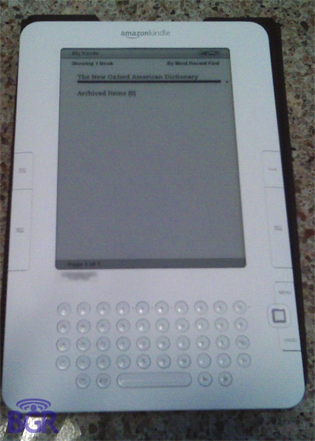 On PC Pro, Stuart Turton blogs on his experience showing his Kindle to inhabitants of a very poor area of central India. He reports that even though they could have no idea what it possibly was, all the kids who saw his device were enthralled by its nifty features, and even the adults of the village were excited by it.
On PC Pro, Stuart Turton blogs on his experience showing his Kindle to inhabitants of a very poor area of central India. He reports that even though they could have no idea what it possibly was, all the kids who saw his device were enthralled by its nifty features, and even the adults of the village were excited by it.
After about ten minutes, I let one of the kids play with it, but instead of trying to mess with the bells and whistles, he just started reading aloud. I was wrong before: this is the point of technology. Debating the implications of eBook readers on education is an entire blog in itself, but I think a charity could do a lot worse than to load a few up with dictionaries, school books and novels and send them to some remote schools in developing nations.
From these reactions, Turton suspects that sending Kindles to schools in underdeveloped nations would be a very worthwhile project.
Of course, we already know it is, given the successes Worldreader has been having, but it’s interesting to see others starting to get that point, and to blog about it elsewhere. Perhaps if enough people get this idea, it could lead to additional support, funding, and similar charities popping up.
(Found via Slashdot.)

































The combination of ultra-long battery life, clear paperlike screen, and cellular wireless with a semi-competent browser certainly makes the Kindle design a viable literacy tool. I do wonder if a more general-purpose OS might not fit this function a bit better. One that allows for some content creation.
Or maybe a cloud-based service aimed at literacy reader gadgets?
Certainly, with eink tech evolving into faster refresh rates, a video-capable Kindle would be a valuable literacy tool.
This is one area where volume may matter more than capability; being able to deliver the things by the million might matter more than being able to deliver the full modern computing experience as OLPC tries.
Somebody ought to talk to the Gates Foundation; this iss right up their alley.
Really? Do you genuinely think that ereaders are what remote schools in developing countries need? What about the electricity, adapters, the fact that they break? What’s wrong with sending them books – you don’t need electricity to read a book and, for the price of an ereader, you can send far more.
Very well said Val. Insane idea.
We are already deploying eReaders as digital libraries in developing world schools – google us: yellobric
P.S. Val & Howard – mobile phones and mobile infrastructure are wide spread in may developing nation. Small industries exist that supply, charge and maintain mobiles which can also serve eReaders. We try to use these local resources best we can.
What wrong with sending them books; short answer is expense. We can purchase load and deploy up to 24,000 eBooks (although presently our library is c.2,500 and counting) on an eReader for around £100. Once you’ve transported them that probably would only get you 20 conventional books if you’re lucky.